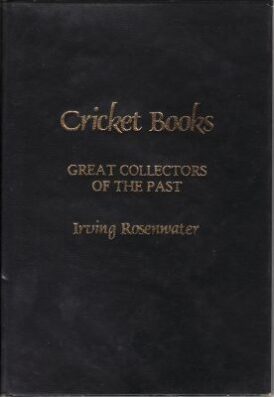Cricket Books: Great Collectors of the Past
Martin Chandler |Published: 1976
Pages: 40
Author: Rosenwater, Irving
Publisher: Private
Rating: 4 stars

When Rosenwater privately published this one interest in cricket books was on the increase, and the number of active collectors had grown accordingly. Rosenwater was one himself of course, as were others who he would write about in the future, men like Geoffrey Copinger and Tony Woodhouse.
With this project however, for once a leather bound hardback in an edition limited to 200 copies, Rosenwater looked back to a gentler age. He is at pains to point that collectors then were fewer in number, and the prices they paid for their prizes were much lower*.
The collectors featured in this monograph are, in chronological order, AL Ford, Thomas Padwick, Charles Pratt Green, Rev RS Holmes, AD Taylor, FS Ashley-Cooper, Sir Julien Cahn, CJ Britton and Rockley Wilson. To demonstrate the period over which they collected the first, Ford, was born in 1823 and the last, Wilson, died in 1957.
They are an interesting selection of individuals. Ford came from a privileged background and was an accountant. Padwick was a chemist, Pratt Green a wine merchant, Britton a farmer and Taylor a publican. Holmes title speaks for itself and Cahn made a fortune from selling furniture. Unusually for a collector a fine player, Wilson was a schoolmaster at Winchester College and played once for England in Australia in 1920/21. As for the remaining member of this exclusive group even today the name Ashley-Cooper needs no introduction to cricketing bibliophiles.
Unsurprisingly this book is unlikely to appeal to anyone who is not a collector of cricket books, but for those of us who are it is fascinating. All collectors are at least a little eccentric, but reading this book brought me to the conclusion that perhaps I am not quite as strange as I thought I was, which has done me a great service.
*As they undoubtedly were – even allowing for inflation the prices paid in the era with which Rosenwater is concerned in this book were generally much less than today







Leave a comment